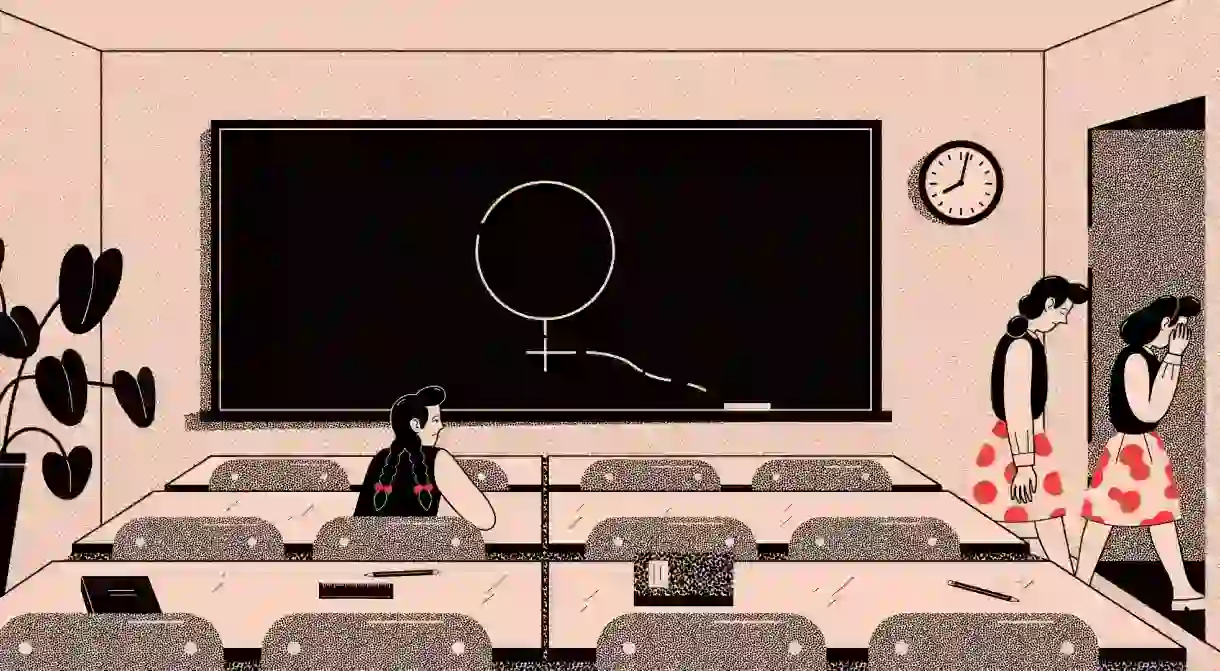Period Poverty Is Still a Barrier to Global Gender Equality

Despite successful campaigns to end the tampon tax and the emergence of the first innovations in the period space since the 1980s, many young women around the world still don’t have access to basic sanitary products, and it’s hindering their future prosperity.
Around 10 percent of girls in sub-Saharan Africa miss school every month during their period, according to a report by UNESCO. The United Nations has noted that among Afghan and Nepalese girls this number is up to 30 percent, while in India around 20 percent drop out of education entirely after their period begins. These young women report resorting to mattress stuffing and tree leaves as alternative staunching materials, but leaks are common and many opt to stay at home to avoid embarrassment.
“Challenges [these girls] face include a lack of access to safe, clean toilets with water nearby for washing blood off their hands and clothes, and a mechanism for disposing of used menstrual materials, particularly when they are at school,” explains Marni Sommer, an associate professor of sociomedical sciences at Columbia University, whose doctoral research examined the ways puberty hinders the academic performance of young women in Tanzania. “For many girls, access to menstrual supportive supplies such as disposable or reusable pads and underwear are a challenge.”
Of course missing up to a week of school every month, or dropping out altogether, puts these young women on the back foot when it comes to schooling. Without a proper education the gender equality gap expands, the pool of jobs open to them shrinks, and the chances that they will end up married before the age of 18 reportedly increases threefold.
The plight of these girls has ignited a slew of non-profits attempting to solve the issue, like KiliPads—a Tanzania-based social enterprise consisting of women who make and sell reusable sanitary pads to the local community.

“UN figures say 63 million girls are missing school because of their periods,” explains Affi Parvizi-Wayne, founder of UK-based organic tampon subscription service, Freda, who supports KiliPads. “[The cause] ticked all my boxes because I think the way we progress is by empowering people. Freda guarantees buying a certain number of reusable pads from KiliPads, which means [the makers] are guaranteed an income, and we give the pads to local school girls in Tanzania.”
But, she notes, the issue is affecting women on her doorstep, too: “There are even girls in the UK who don’t go to school because their parents can’t afford it. It’s a choice between food or [feminine hygiene] products.”
With female entrepreneurs winning investment for alternatives to the pad and tampon, like THINX period-proof underwear and FLEX menstrual discs, it’s easy to assume periods are no longer a barrier in the West. But wherever there is poverty access to sanitary period solutions proves problematic, and these innovations—impressive though they are—are only accessible to women with ample money to spend on self-care (THINX, for example, cost $24–$39 per pair).
A 2017 survey by Plan International UK reported that one in 10 girls between the ages of 14 and 21 have been unable to afford sanitary wear, and 12% have had to improvise with other materials during their period.
Across the pond it’s a similar state of affairs. Last year’s census revealed that 16.3 million American women, around one in eight, live below the poverty line, with women of color being disproportionately affected. While low-income families receive supplemental health from the government, many programs consider menstrual products a luxury rather than an essential.
“In order to have a fully equitable and participatory society, we must have laws and policies that ensure menstrual products are safe and affordable and available for those who need them,” writes activist Jennifer Weiss-Wolf in her book Periods Gone Public: Taking a Stand for Menstrual Equity (2017). “The ability to access these items affects a person’s freedom to work and study, to be healthy, and to participate in daily life with basic dignity. And if access is compromised, whether by poverty or stigma or lack of education and resources, it is in all of our interests to ensure those needs are met.”
Thanks to the work of activists and non-profits awareness is increasing and the cause—ensuring women’s biological functioning doesn’t hinder their daily lives and future successes—is gaining traction. While menstruation products are not yet provided free of charge in public spaces globally the way other sanitary essentials like soap and toilet paper are, it’s beginning to feel like a not-so-distant possibility.













